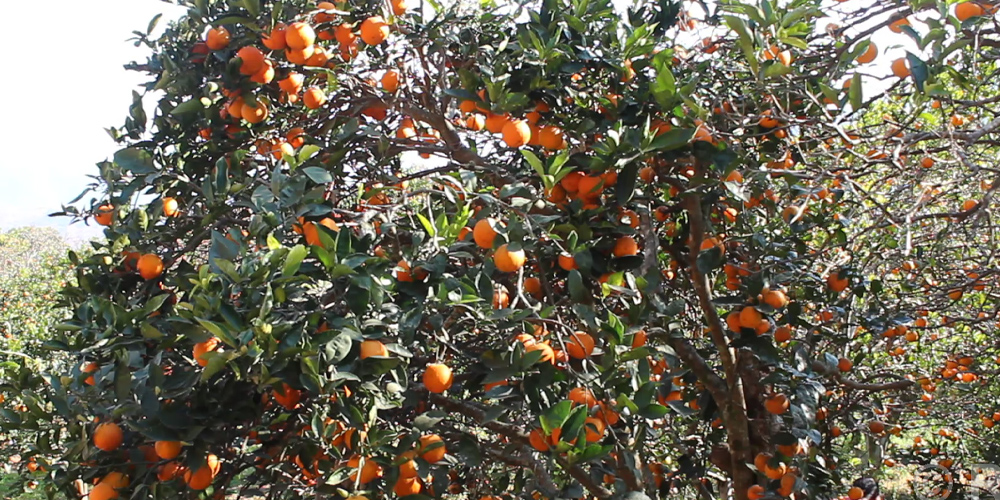- Thursday, 5 June 2025
Sindhulli's junar farmers in long wait for revival of cold store, industry
Kamalamai (Sindhuli), June 3: Long before Sindhuli was yet to be connected by a proper road network, local farmers had already begun producing up to 10,000 tons of junar (sweet orange, Citrus sinensis) each season. However, due to the lack of market access and transportation infrastructure, most of the fruit would rot in the orchard, with farmers' toil and investment going to waste.
Without a reliable transport system, it was nearly impossible for producers to get their harvest to the market. Although the sweet orange orchards along the Mahabharat range yielded a promising quantity of fruit, the lack of transport infrastructure enabling the export caused a significant waste of farmers' investment.
Farmers with the strength to carry their harvest in doko (traditional bamboo baskets) would spend an entire day reaching Madhi Bazar, only to sell a small portion of their produce while the rest perished due to lack of storage and timely market access.
In 2063 BS (2006 AD), construction o a cold storage facility began in Dobhantar, Kamalamai-4, Sindhuli. The facility came into operation in 2067 BS (2010 AD), according to Deepak Koirala, Chairperson of the Junar Central Cooperative Union and a member of the Junar Industry Operating Committee.
“We had to bear a loss of Rs. 2.5 million during the first two years of operating the cold store,” Koirala recalled. “Due to a lack of proper technical knowledge, both fruits and potatoes stored in the facility got spoiled.”
In 2012 AD, a significant breakthrough came when the Governments of Nepal and China signed an agreement under which China agreed to import sweet oranges from Nepal. Following this, China’s General Administration of Quality Supervision, Inspection and Quarantine, in coordination with Nepal’s Department of Agriculture, initiated steps to prepare Sindhuli’s junar for export including improvements in storage, quality control, and packaging.
To support this endeavor, the Sindhuli Chamber of Commerce and Industry, in collaboration with the Federation of Nepalese Chambers of Commerce and Industry, launched the construction of a dedicated junar industry building. These institutions, established to safeguard the rights of entrepreneurs and to support commercial development, played a key role in turning local production into an export-ready enterprise.
It took around three years to install necessary equipment and machines as well as make necessary arrangements in order to bring the factory into operation. The factory had made agreement with farmers to buy junar at Rs 25 per kg.
He shared, "The factory had made agreement to buy 2,000 tonnes of this fruit with farmers. The production decreased after junar trees faced pest issues and the factory got only 200 tonnes of junar. "
During that period, BP Highway came into operation and the fruit produced there had started getting market with the operation of the highway. Though the government had made such agreement to export junar produced in Sindhuli to China, it has not been possible to export it so far.
Also a junar farmer, Koirala argued that junar produced in Sindhuli could not been exported to China due to a minor mistake while signing agreement. In the agreement, it was mentioned that junar gardens should be disease and pests free.
As per the farmers, it was impossible to make tress diseases and pests free. Junar produced in Sindhuli could be exported to China easily if it was mentioned in the agreement that fruits should be free of disease and pests.
Koirala, Chairperson of Junar Central Cooperative Union Ltd, mentioned that more than 2,000 junar farmers have been displaced from junar farming. In the beginning, 3,100 farmers were involved in junar farming.
Earlier, the farmers used to produce 10,000 tonnes of junar. Now it has decreased to 3,000 tonnes and it has now become difficult to bring the Junar factory into operation due to lack of its market to China, decrease in its production and lack of necessary raw materials.
The junar cold storage constructed with financial support of Japanese Embassy and junar factory constructed under the public-private partnership model has remain closed for a decade due to apathy of bodies concerned.
A total of Rs 13 million was spent in a building where a cold storage was brought into operation. The Japanese Embassy had spent six million rupees while the rest of the amount was collected from the then District Development Committee, village development committees and junar farmers.
Construction of Junar Processing Industry stalled
On the other hand, the Sindhuligadhi Junar and Fruit Processing Company which is being constructed with a total investment of 60 million rupees under the government's PPP model, is in a pitiable condition. The government, industrialists and farmers have invested in this industry.
The construction of the industry being built on five katthas of land under the Federation of Nepalese Chambers of Commerce and Industry (FNCCI)'s "One Village, One Product" project was halted after the federation withdrew its support and the government stopped providing the remaining 20 million rupees.
Although the sweet orange industry was launched in the district with great hope and considering its feasibility, it is said that after the change in the FNCCI's leadership, the successive leadership have ignored their pet project. The idea of setting up the Junar industry was promoted by FNCCI former president Suraj Kumar Baidya.
The industry is still being led by Baidya and he is taking initiatives to operate it again.
Local junar farmers are concerned that the only industry operating in the district has not been brought into operation despite being closed for a long time.
President of Sindhuli Chamber of Commerce and Industry, Arjun Kumar Kshetri, said that it is necessary to establish junar industries to develop the district as an industrial center.
"The junar industry was established as the first industry in Sindhuli, but it has been closed for a long time. We have come to know that the reason for this is nothing other than the squabble among the industry promoters," he said.
Kshetri urged the local government, provincial government, and federal government to assist in bringing the industry, which has been closed for a long time, back into operation. According to him, the Sindhuli Chamber of Commerce and Industry is ready for coordination in this effort.
Minister of Industry, Commerce, Land and Administration of Bagmati Province, Sukumaya Tamang, said that the provincial government is willing to provide necessary support to restart the industry.
If this industry can be operated, local junar farmers will receive a better market for their produce, which will also contribute to the overall economic and industrial prosperity of the district.
Junar farming in Nepal dates back to the Rana regime. Until the 1970s, junar farming was pursued mainly for personal consumption, but after the realisation of economic benefits, the government promoted its commercial farming under the 6th Five-Year Plan.
Sindhuli and Ramechhap districts saw special programmes for junar farming in the early 1980s. Ramechhap was declared a “junar zone” in 2019 (2076 BS) under the Prime Minister's Agriculture Modernisation Project.
Farmers from 49 districts grow junar today, and Ramechhap and Sindhuli continue their legacy as leading producers. (RSS)





-square-thumb.jpg)





-original-thumb.jpg)



